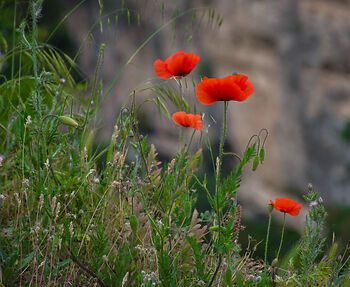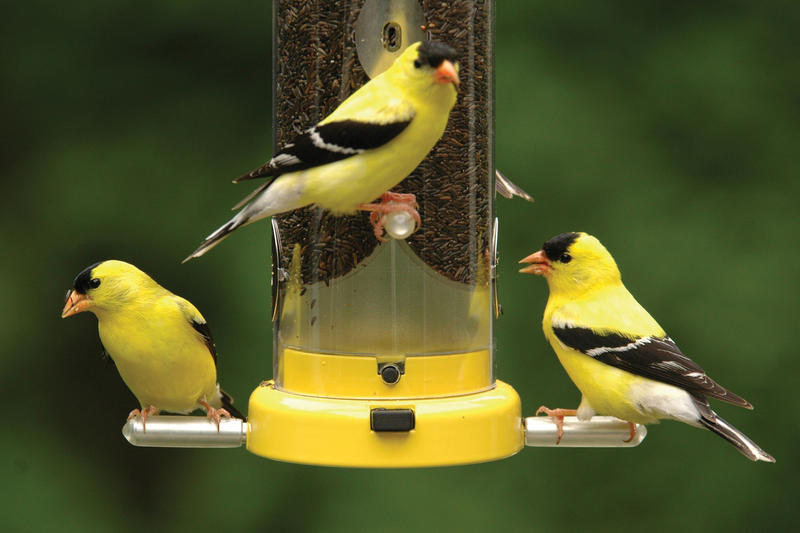
With inspiration from poet Mary Oliver and a lovely devotional from Salt*, we’ll travel a Lenten journey together toward Easter morning. Through the discipline and joy of setting a little time aside for special Lenten devotions during these 40 days, we can do our part, in a world so full of shadows, to help lengthen the light and welcome the blessing of God’s spring at Easter.
The Mary Oliver poems referred to in this devotional are all available in her definitive collection, Devotions, which spans more than five decades of her literary career. All of the poetry is also available online. Simply search for “poem title” by Mary Oliver.
Easter Sunday, April 4, 2021
Read
Scripture: Mark 16:1-8
And very early on the first day of the week, when the sun had risen, they went to the tomb.
Poems
Mary Oliver, “Morning Poem” and “Swan,” Devotions, pp. 345 & 62
Prayer
Risen and rising God, help us dare to pray, dare to rise, dare to be a blazing lily this morning, and every morning. Hallelujah! Amen.
Christ is Risen–Alleluia!
The forty days of Lent now give way to fifty days of Eastertide, a season overflowing with the poetry of resurrection: an empty tomb; a risen, wounded savior; a joyful, astounded community; and a promise of the Spirit to come.
The light has lengthened into morning. The new life of spring has arrived. Go now in peace to love and serve God and neighbor, world without end, Amen.
Pay attention!
Be astonished!
Tell about it!
Good Friday, April 2, 2021
Read
Scripture: John 18:1-19:42
So they took Jesus; and carrying the cross by himself, he went out to what is called The Place of the Skull, which in Hebrew is called Golgotha.

Poem
Mary Oliver, “Lead,” Devotions, p. 146
Prayer
God of sorrows, help us follow you to the foot of your cross, and so to the foot of every cross, everywhere. Let our hearts be broken open. Have mercy on us. Amen.
Meditate
Why do we call this Friday “good”? Is it because Jesus shows us love and mercy even unto death? Is it because the cross declares God’s solidarity with all those who suffer, or that God has canceled every debt? Is it because Jesus subversively transforms some of the worst things in the world (the Roman cross, violence, hate crime, betrayal among friends) into some of the best things in the world (the Tree of Life, grace, resurrection, forgiveness among enemies)–thereby proclaiming that in the end, God will redeem everything? Is it because, as Oliver puts it, this story will break our hearts open, never to close again to the rest of the world?
More Light
Pair these readings with Oliver’s “Poppies,” a meditation on the power of life over loss and death (Devotions, p. 291).
Practices
Today light a candle of sorrow, praying, “God of mercy, forgive us. Break our hearts open, never to close again to the rest of the world.”
Reach out to someone who has sorrow in his or her life today.
How can the suffering and death of Jesus open our hearts to suffering and death in the world around us? Explore this question in a journal, or discuss it with someone you love.

Maundy Thursday, April 1, 2021
Read
Scripture: John 13:1-35
Then he poured water into a basin and began to wash the disciples’ feet and to wipe them with the towel that was tied around him.
Poem
Mary Oliver, “Singapore,” Devotions, p. 326
Prayer
God of love, help deepen and strengthen our love, for you and for our neighbors. Make our love as simple and as beautiful as a bowl full of water. Amen.
Meditate
What does genuine love look like in practice? Here Jesus teaches his disciples that it looks like humble, tangible, vulnerable service: foot-washing illustrates his new commandment to “love one another, as I have loved you” (“Maundy” is from an old word for “mandate” or command). Likewise, Oliver’s chance encounter with a woman cleaning a restroom becomes a window into how dignity and humility intertwine, and how “light can shine out of a life.” And so the question is this: how can we make our love more tangible, more luminous, more clear?
More Light
Tonight, Jesus will pray in the Garden of Gethsemane; to follow him there, see Oliver’s “Gethsemane” (Devotions, p. 129).
Practices

Today light a candle of love, praying, “God of love, help my love become more tangible, more luminous, more clear today–and every day.”
Reach out to someone who has been kind to you, and express your appreciation face to face (online counts!) or with a note.
Wash the hands or feet of a family member; make someone a meal; give a pet a special treat; or put up a new birdfeeder.
How can you love become more tangible, more concrete, more incarnate? Explore this question in a journal, or discuss it with someone you love.
Palm Sunday, March 28, 2021
Read
Scripture: Mark 11:1-11
Go into the village ahead of you and immediately as you enter it, you will find tied there a colt that has never been ridden; untie it and bring it.

Poem
Mary Oliver, “The Poet Thinks about the Donkey,” Devotions, p. 130
Prayer
God of glory, help us to see how you shine in the most humble of creatures. Open our ears to the hosannas all around us–and help us to join in and sing! Amen.
Meditate
Jesus was a skilled student and faithful lover of scripture, and here in a kind of street theater he enacts a passage from the ancient prophet Zechariah. The crowds fully participate in the performance, lavishing praise on the triumphant king, “humble and riding on a donkey” (Zechariah 9:9). Oliver zeroes in on the donkey himself, the humble creature carrying the humble savior, calling our attention to how even the most “lowly” can play indispensable roles in the grand drama of salvation, in Jerusalem and beyond.
More Light
For a deeper dive into the jubilation of Palm Sunday, see these two poems on praise: “The Chat” and “Just Lying on the Grass at Blackwater” (Devotions, pp. 139 & 163).
Practices

This week begin each day by lighting a candle of praise, praying, “God of glory, God of love, help me praise you today in all I do and say.”
Text three people today with words of praise and encouragement.
Experiment with a “criticism fast,” refraining from disparaging yourself and others, thereby making room for words of support and appreciation.
For what in your life (big things and little things) do you most want to praise God? Explore this question in a journal, or discuss in person or online with family and friends.
Fifth Sunday of Lent, March 21, 2021
Read

Scripture: Jeremiah 31:27-34
I will put my law within them, and I will write it on their hearts; and I will be their God, and they shall be my people.
Poem
Mary Oliver, “Mindful,” Devotions, p. 173
Prayer
God of wonder and delight, help us notice the miraculous, today and every day. Write your law on our hearts. Amen.
Meditate
What if God’s law were “written on our hearts”? Instruction would no longer be needed, since genuine joy and praise, compassion and justice would all be second nature. The prophet Jeremiah declares that such days “are surely coming”; in the meantime, we may learn from the Spirit through a thousand teachers all around us. To walk with Oliver is to join her in this kind of mindful day-to-day learning, all for the sake of that day when instruction is no longer necessary.
More Light
For variations on the theme of mindfulness and learning from the ordinary wonders of the world, see Oliver’s “This Morning” and “To Begin With, the Sweet Grass” (Devotions, pp. 4 & 76).
Practices

This week begin each day by lighting a candle of mindfulness, praying, “God of wonder and delight, help me notice the miraculous today.”
Try what renowned preacher Fred Craddock calls “going marveling”: an afternoon or evening walk to gather marvels (sights, sounds, shells, stones, flowers, pine cones–anything that brings to mind God’s marvelous generosity!). Post a photo of your discoveries on Facebook or Instagram.
Experiment with a “mindfulness fast” this week, setting aside things and activities that create undue distraction and stress: television, the news cycle, your Twitter feed–whatever threatens to pull you out of the present moment.
Where and when would you like to be more mindful (the homefront, your commute, the natural world, relationships, parenting, etc.)? Explore these questions in a journal, or discuss it with someone you love.
Fourth Sunday of Lent, March 14, 2021
Read
Scripture: John 3:14-21
Indeed, God did not send the Son into the world to condemn the world, but in order that the world might be saved through him.
Poem
Mary Oliver, “Some Questions You Might Ask,” Devotions, p. 313
Prayer
God of all creation, help us to see the world you have made, the world you mean to save. Show us the breadth of your love. Amen.
Meditate

Jesus speaks here of both grace and judgment, but his emphasis is on grace: after all, in Numbers 21 the bronze serpent Moses lifted up saved all the afflicted Israelites, not just a few; and likewise, God’s Son came not to condemn the world but “in order that the world might be saved.” Oliver’s poem can be read as a provocative, playful riff picking up on the striking fact that Jesus does not say, “in order that all people might be saved.” For aren’t the bear and the hummingbird, the snake and the scallop, the iris and maple tree included among God’s beloved?
More Light
For another meditation on the nature of salvation and “the path to heaven,” see Oliver’s “The Swan” (Devotions, p. 331).
Practices
This week, begin each day by lighting a candle of grace, praying, “God of mercy and hope, help me expand the circle of those I love.”
Look for moments–a conversation, a Facebook post, a phone call–in which you might be tempted to offer words of judgment, and instead offer words of grace and understanding.
Learn something new about a creature you know little about–perhaps even one you don’t like! Share what you learn with at least one other person, or post it for others to enjoy.
Where does your circle of love need to be expanded? Explore these questions in a journal, or discuss with family alnd friends in person or online.
Third Sunday of Lent, March 7, 2021
Read

Scripture: John 2:13-25
Making a whip of cords, he drove all of them out of the temple, both the sheep and the cattle. He also poured out the coins of the money changers and overturned their tables.
Poem
Mary Oliver, “Where Does the Temple Begin, Where Does It End?” Devotions, p. 186
Prayer
God of justice, help us to protect the vulnerable with wisdom and audacity. Show us your true temple. Amen.
Meditate
Here Jesus is filled with fierce and righteous anger. Why? Because the temple–“my Father’s house”–has been desecrated by a crass form of profiteering. Jesus’ love for the temple runs deep, and he challenges us not only to feel the same but also to ask where the boundaries of “the temple” really are. Does the sacred ground end at the sanctuary door? Or does it include the woods, the birds, and the sky, as both Oliver and Genesis 1 would suggest? Does the temple include Christ’s own body, and so all of our bodies as well (John 2:21)? And if it does: how shall we fiercely love and defend “the temple” today?
More Light
For another exploration of both the world’s desecration and righteous anger, see Oliver’s “Tecumseh” (Devotions, p. 387).
Practices

This week begin each day by lighting a candle of courage, praying, “God of love, help me live today in ways that consecrate the world, defend the vulnerable, protect what is good, and honor creation.”
Experiment with a “creation care” fast this week: walking or biking to work or school; using less electricity, water, or toxic chemicals; or eating vegetarian or vegan meals this week (or for the rest of your life!).
Write a letter for Amnesty International or another advocacy group.
What does “righteous anger” look like in the world and in your own life? Where is your temple, the place or time or way you sense God’s presence? Explore these questions in a journal, or discuss it with someone you love.
Second Sunday of Lent, February 28, 2021
Read

Scripture: Mark 8:27-38
For what will it profit them to gain the whole world and forfeit their life?
Poem
Mary Oliver, “In Blackwater Woods,” Devotions, p. 389
Prayer
God of grace, help us to love what is mortal. Give us the courage to hold it close and, when the time comes, to let it go. Amen.
Meditate
The passage in Mark is full of mysteries, and at its core is how salvation somehow involves both losing one’s life and saving it. Jesus warns that there are ways to “gain the whole world” and yet still lose your life; and at the same time he promises that God works through loss in order to save. With Oliver, we can see these mysteries unfold in the natural world–and in our own lives–through the ancient rhythms of giving and receiving, losing and saving, holding on and letting go.
More Light
For wisdom on how “losing one’s life” should never mean merely succumbing to the needs of others, see Oliver’s “The Journey” (Devotions, p. 349); and for her take on Jesus, love, mystery, and miracles, see “Logos” (Devotions, p. 179).
Practices

This week begin each day by lighting a candle of salvation, praying, “God of grace, help me love what is mortal. Help me hold on to what needs to be embraced, let go of what needs to be let go–and have the wisdom to know the difference.”
Experiment with a “letting go” fast this week, creating little sanctuaries of Sabbath time. Try fasting from technology for an hour, a day, or the whole week; or create a mealtime “Sabbath box” for cell phones or other devices, so you can better taste and see how God is good!
Reach out to someone living an “all-in” life of service, and thank them for their commitment and inspiration. Schedule an other get together or Zoom meeting to learn more about their work and how you can help.
Make of list of what you need to embrace and to release in order to live more fully. Make the list itself beautiful (handwrite it on special paper; illuminate initial letters like an ancient manuscript; whatever works!) and put it up somewhere you’ll see it every day. Explore this question in a journal, or discuss it with someone you love.
First Sunday of Lent, February 21, 2021
Read

Scripture: Mark 1:9-15
The time is fulfilled, and the kingdom of God has come near; repent, and believe in the good news.
Poem
Mary Oliver, “Wild Geese,” Devotions, p. 347
Prayer
God of life, help us change our lives. Soften our hearts. Help us to repent, and to believe in your good news of wild love and grace. Amen.
Meditate
The baptism-in-the-wilderness by John was about repentance, and Jesus’ preaching was, too. In Mark’s original Greek, the word for repentance is metanoia, from meta (“change”) and noia (“mind”); today we might say, “change of heart,” or “change of life.” Oliver claims that this kind of change doesn’t flow from self-defeating guilt but rather from incarnate, wild, imaginative love for the world. So: what “change of life” is God calling you toward today, nipping at your heels like a wild goose, that ancient Celtic image for the Holy Spirit?
More Light
For more on the holy wildness of love, human and divine, see Oliver’s “Wild, Wild” (Devotions, p. 156).
Practices

This week begin each day by lighting a candle of repentance, praying, “God of mercy, help me change my life; let me love today with a wild and imaginative love, on earth as it is in heaven.”
Schedule a “wilderness walk,” listening for how God may be calling you to change.
Reach out online or in person to an organization changing the world in inspiring ways, and learn more about their work, their impact, and how you can get involved.
Power down, take a breath, look out a window, and experiment with journaling this week. What changes are you making (or would you like to make) to be more in tune with God’s good news? Explore this question with someone you love.
Ash Wednesday, February 17, 2021
Read

Scripture: Matthew 6:1-6, 16-21
For where your treasure is, there your heart will be also.
Poem
Mary Oliver, “Storage,” Devotions, p. 7
Prayer
God of dust and fire, help us lay our burdens down, so our hearts may be set right–and so we might fly! Amen.
Meditate
In this passage from the Sermon on the Mount, Jesus challenges us to examine our motives and priorities. When we pray, give alms, fast, or shop–what’s really driving us? Are we secretly (even behind our own backs) trying to impress others? Are we storing up “treasures on earth,” in effect placing our tender hearts in the wrong place? Like Oliver, have we become weighed down by things? Is it time to “make a beautiful fire”? How might a season of fasting from things free us to fly?
More Light
Pair Jesus’ instruction on prayer in this passage with Oliver’s “Praying” and “The Summer Day” (Devotions, pp. 131 and 316).
Practices

This week begin each day by lighting a candle of simplicity, praying “God of light and life, help me to focus on what’s most important today. Turn my heart away from things and towards your grace and newness of life.”
Schedule a “spring cleaning,” simplifying your life by purging or donating whatever things are weighing you down–and notice the lightness and life this practice can bring!
Fast from buying and consuming this week. How might owning or using less make more room in your heart and reveal the goodness of God’s grace? Explore this question in a journal, or discuss it with someone you love.

